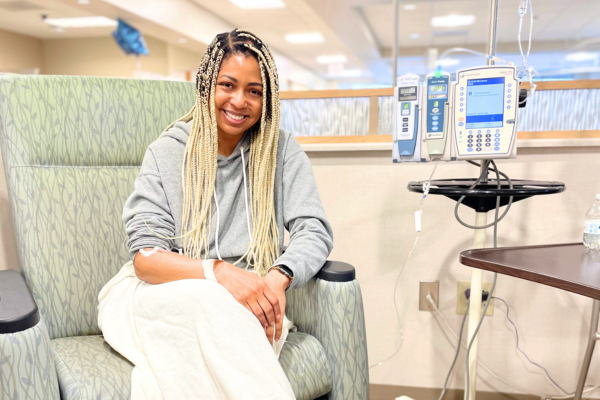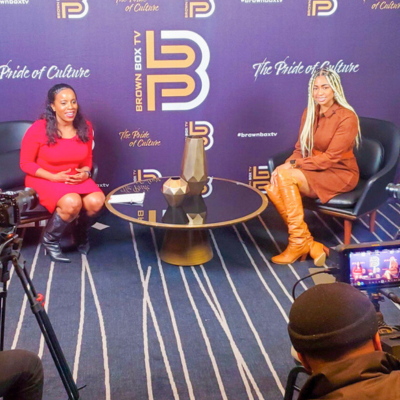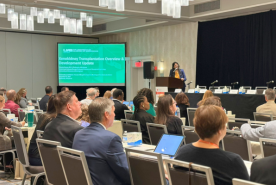August 28, 2025
A flawed equation delayed Crystal's kidney transplant after her kidneys failed during pregnancy. Now she shares her story to fight health disparities.
“I Thought It Was Over”
That’s what Crystal King believed when the medications worked, and her swelling went down.
She was just 14 when she was first diagnosed with kidney disease, but no one told her it was chronic. It wasn’t until pregnancy triggered kidney failure that Crystal fully grasped the seriousness of her condition.
What followed was a fight for her life and for others like her.
The First Signs of Kidney Disease
In 1994, Crystal’s body changed in ways neither she nor her family could explain.
“My face began swelling,” Crystal said. “I went to the doctor, but no one could tell me why.”
After a week of testing, doctors diagnosed her with kidney disease and prescribed steroids. These helped calm Crystal’s immune system and reduce swelling.
“I got better. I thought it was over,” said Crystal. “No one told me or my family that kidney disease is chronic.”
Since Crystal didn't have the tools to understand her condition or how to manage it long term, she had no idea that her kidneys were slowly declining.
“I got very sick in my senior year of high school. I thought it was related to my kidneys. But then it went away again,” said Crystal. “After graduating from college, I was able to find a nephrologist (kidney doctor).”
The nephrologist found that Crystal had high blood pressure, a condition that can further damage the kidneys.
“I was put on high blood pressure medication to help protect my kidneys,” Crystal said. “I started a low-sodium diet.”
The diet and medication helped. For the next two decades, Crystal felt well.
Pregnancy and Kidney Failure
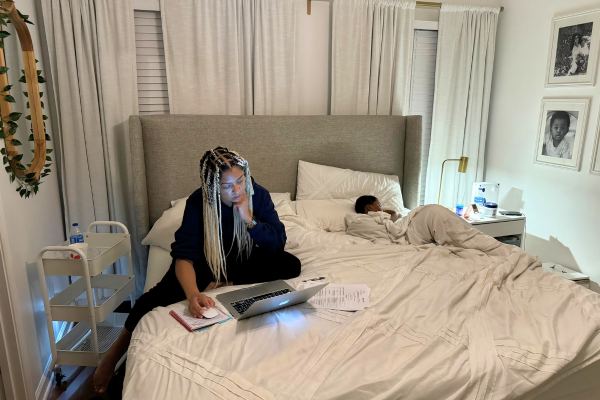
In 2016, Crystal was 36, newly married, and ready to start a family. That’s when her health took a serious turn.
“I got pregnant with my son, and my kidney function dropped sharply. Medicine could no longer manage my high blood pressure,” said Crystal. “I developed preeclampsia and had to go on bed rest.”
Preeclampsia is a serious pregnancy complication that causes high blood pressure and protein in the urine. It can lead to acute kidney injury or permanent kidney damage.
While pregnant people with kidney disease are more likely to develop this condition, it isn’t all bad news.
A 2015 study found that 20-30% of pregnant people with kidney disease had worsening kidney function within 1 year postpartum. But only a small percentage, around 5–10%, progressed to end-stage or stage 5 kidney disease during the follow-up several years later.
Unfortunately, for Crystal, it led to stage 5 kidney disease. While she didn’t need dialysis yet, it would only be a matter of time.
“I felt like death was imminent,” said Crystal. “I began documenting my life for my son in case I passed away.”
Crystal delivered her son prematurely. Both Crystal and her baby spent the next month in the hospital fighting.
Subscribe today!
Join the NKF Blog Newsletter
Get inspirational stories and kidney disease resources delivered to your inbox every month. You'll gain practical insights and expert advice to help you better understand and manage your kidney health, no matter where you are on your kidney journey.
A Flawed Equation
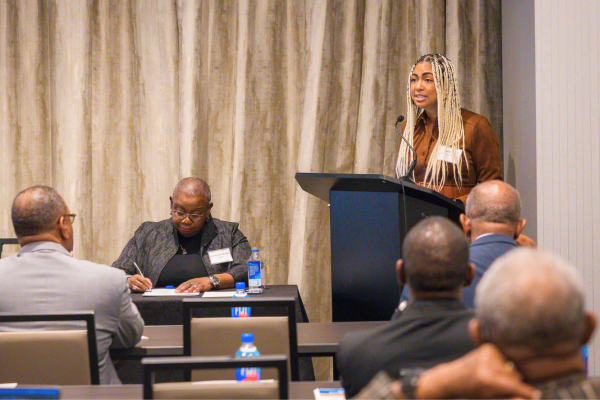
While Crystal returned home, she was still incredibly ill. She was on the kidney transplant waitlist, but her eGFR wasn’t low enough for a kidney transplant.
“Back then, the eGFR equation used race to help determine kidney function. Because of this, my eGFR was too high for a transplant,” Crystal said. “I felt like death daily, but my doctors kept saying, 'You're fine.'"
Crystal didn’t stand by, waiting. She began her search for a living kidney donor.
“My family knew I was looking for a donor, and I started sharing my story online,” Crystal said. “In 2019, my cousin, Mia, stepped up and began the kidney donor evaluation.”
Mia turned out to be a match and a good donor candidate.
“In March 2020, my eGFR dropped low enough for transplant,” Crystal said. “Since Mia was approved to donate to me, I hoped I could get a preemptive transplant.”
NKF is here for you, whether you’re looking for a living kidney donor or want to become one. Watch videos by patients and living donors to learn more.
Starting Dialysis During the COVID-19 Pandemic
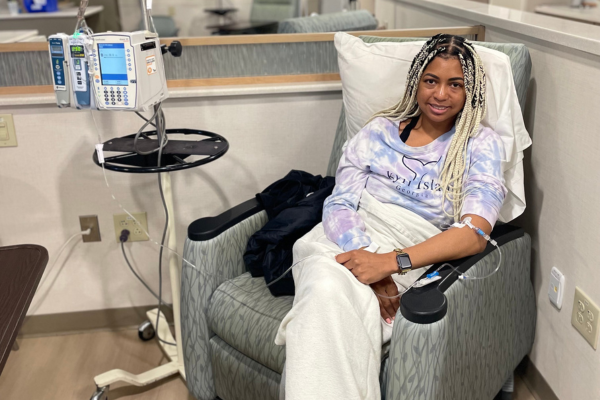
Then COVID-19 happened. By the end of March, all the transplant programs shut down. National Kidney Foundation (NKF) immediately mobilized to recategorize transplantation from an “elective" surgery to an essential surgery.
While advocates worked to reopen transplant centers, Crystal had no choice but to start dialysis. She began peritoneal dialysis, a home dialysis treatment that uses the lining of the abdomen to filter blood.
“I needed a sterile environment for dialysis, but there was a mask, hand sanitizer, and glove shortage,” Crystal said. “There were no vaccines for COVID-19 yet, so I was worried about infection.”
Thankfully, transplant centers reopened shortly after due to NKF and other organizations’ advocacy.
“In June, my center called to schedule the surgery. I was excited but terrified to set foot in a hospital,” said Crystal. “Mia convinced me to do it, and I’m so glad we did."
The surgery occurred on July 21st. Both Crystal and her cousin recovered well.
“I didn’t realize how sick I was until I felt better. The transplant was truly life-changing. I’m so blessed that someone would donate a kidney to me,” Crystal said. “I celebrate life daily.”
Considering home hemodialysis? Take our quiz to find out if it is right for you.
From Patient to Advocate

Crystal started sharing her journey on social media when her kidneys began failing—not to educate others, but to process what she was going through.
“I started sharing my journey on Instagram under the name ‘justthekings,’” Crystal said. “I never planned on becoming a kidney health influencer.”
Then something changed.
“People started messaging me: ‘What’s dialysis like?’ ‘How do I talk to my family about donation?’ ‘What happens at a transplant evaluation?’ I realized I was helping people by sharing my story.”
Crystal now has more than 8,000 followers on Instagram and has embraced her role as a kidney health influencer and advocate.
"As a Black woman in this country’s health system, I’ve experienced a lot of disparities. I wasn’t given the information I needed early on. I was sick for much longer due to a flawed equation that added around three years to my wait for a transplant. I don’t want this to happen to others.”
Today, Crystal advocates with NKF’s Voices for Kidney Health group and runs the Kidney Champion Foundation, a nonprofit she started that educates historically excluded communities about kidney disease.
"What I love about NKF is that they believe patients should lead. They give us tools and opportunities to tell our stories in ways that change policy,” Crystal said. “They’re not just talking about equity—they’re doing something about it.”
Crystal encourages others to begin their own advocacy journey, saying, “There aren’t enough people fighting for kidney patients.”
“I leaned in once I understood my story’s impact,” Crystal said. “Join NKF, get involved with another advocacy group, or contact your local representatives. There’s power in telling your kidney story.”
